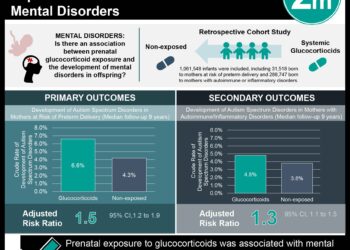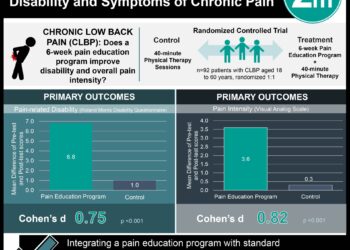Children with disabilities at variable risk for maltreatment
1. In this population-based study of Australian children, children with disabilities made up 25.9% of children with maltreatment allegations and 29% of children with substantiated allegations.
2. The risk of maltreatment varied across different types of disability. The groups with highest risk of maltreatment allegation and substantiation were children with intellectual disability, mental/behavioral problems, and conduct disorder.
Evidence Rating Level: 2 (Good)
Study Rundown: Research has demonstrated that children with disabilities are at increased risk for maltreatment. In addition, families of disabled children are more likely to experience risk factors associated with higher risk of maltreatment. After controlling for these risk factors, it remains unclear whether there is an association between risk of maltreatment and type of disability. Authors of this study aimed to assess the risk of maltreatment among children with various types of disabilities. Disabled children made up 10% of the population studied, while making up 25.9% of children with allegations of mistreatment and a third of children with substantiated allegations. After adjusting for demographic and social characteristics, children with disabilities continued to have increased risk for alleged and substantiated maltreatment allegations. Children with intellectual disability (ID) had the highest risk, followed by those with conduct disorder and those with mental/behavioral disorders. Children with autism had significantly lower risk of maltreatment. Nonetheless, clinicians and policymakers should consider this data as they advocate for improved support systems for families who have children with disabilities.
Click to read the study, published today in Pediatrics
Relevant Reading: The maltreatment of intellectually handicapped children and adolescents
In-Depth [cross-sectional study]: Study authors used a population-based record-linkage method that included all children born in Western Australia between 1990 and 2010 (N = 524 534). Disability information was obtained from 4 different databases, and maltreatment data was obtained from the Department of Child Protection and Family Support. Overall, 10.4% of all children had at least 1 disability and 4.6% of all children had a maltreatment allegation. Of these, 25.9% of allegations and 29% of substantiated allegations included a disabled child. Age and type of allegation were similar between disabled and non-disabled children and between type of disability. Before adjusting for demographic and psychosocial characteristics, disabled children were more than twice as likely to have a maltreatment allegation and 3 times as likely to have a substantiated allegation compared to children without disability (hazard ratio [HR] 2.64, 95% CI 2.56-2.74 and HR 3.09, 95% CI 2.97-3.22, respectively). Highest HRs for maltreatment allegation were associated with conduct disorder (HR 5.14, 95% CI 4.83-5.47), ID (HR 3.86, 95% CI 3.67-4.06), and mental/behavioral disorders (HR 3.69, 95% CI 3.56-3.82) groups. After controlling for psychosocial and demographic factors, risk for maltreatment allegation was still significant and highest for children with conduct disorder, ID, and mental/behavioral disorder. There was a significantly lower risk of maltreatment among children with autism (HR 0.74, 95% CI 0.63-0.89).
Image: PD
©2015 2 Minute Medicine, Inc. All rights reserved. No works may be reproduced without expressed written consent from 2 Minute Medicine, Inc. Inquire about licensing here. No article should be construed as medical advice and is not intended as such by the authors or by 2 Minute Medicine, Inc.







